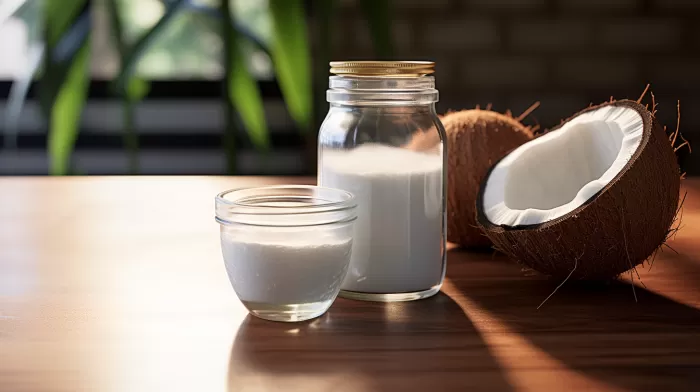Coconut oil has been a controversial topic due to its high saturated fat content, which has led many to believe that it can cause weight gain and heart disease. However, it is important to note that not all saturated fats are created equal. Coconut oil is predominantly composed of a fatty acid called lauric acid, a medium-chain fatty acid that has significant health benefits.
The Benefits of Lauric Acid
One major advantage of lauric acid is its effect on metabolism. Medium-chain fats like coconut oil are metabolized differently than other saturated fatty acids. They have a smaller molecular size, which makes them easier and more efficient to absorb during digestion. Once digested, they go straight to the liver, where they are used as energy and activate mitochondrial cells, increasing metabolism.
Weight loss is another benefit linked to the consumption of coconut oil. Although it is calorie-rich, medium-chain fatty acids are rapidly metabolized, meaning they don’t get stored as fat deposits like long-chain saturated fats. These fats actually improve fat oxidation, helping you burn fat faster. Additionally, they influence appetite-regulating hormones, increasing satiety and lowering overall caloric intake, leading to increased weight loss.
Coconut oil also has heart-protective mechanisms. Polynesian populations that consume large amounts of coconut oil have very low rates of heart disease. While consuming coconut oil increases LDL cholesterol (the bad kind), it also has a more powerful impact on HDL cholesterol (the good kind). Shifting the HDL/LDL ratio has heart-protective benefits, and overall, people eating coconut oil usually see a decrease in total cholesterol levels. Furthermore, coconut oil does not activate the immune system and inflammatory pathways like longer-chain saturated fats, providing more protection to the heart.
Another benefit of medium-chain fats in coconut oil is their ability to promote healthy gut bacteria. Alterations in gut bacteria have been linked to increased risk of obesity and type 2 diabetes, but medium-chain fats can improve the intestinal ecosystem, inhibit or correct gut permeability, and decrease intestinal inflammation. Coconut oil also contains caprylic acid, which helps combat Candida albicans, also known as the silent epidemic.
How to Use Coconut Oil Daily
Coconut oil is a versatile and stable dietary addition. It doesn’t easily become damaged, remains stable at high heat, and is not overly sensitive to light. Its high smoke point makes it an ideal cooking oil for baking, frying, and sautéing, protecting you from consuming oxidized oil particles that can contribute carcinogens to your body, unlike low-quality vegetable oils such as peanut, soy, grape seed, and sunflower.
Choose unrefined or virgin coconut oil and consume it raw, or melt it and add it to salad dressings or smoothies. Even a single dose of coconut oil starting at just 5 grams (about one teaspoon) can provide health benefits. Consuming one tablespoon per day will support metabolism and heart health even more.
The potential health benefits of including coconut oil in your diet should not be overlooked. Its unique composition of medium-chain fatty acids, such as lauric acid, offers benefits ranging from increased metabolism and weight loss to heart protection and promotion of healthy gut bacteria, making it an excellent addition to a well-rounded, healthy diet.
To learn more about the science behind these benefits, check out these research studies from Open Heart and Nutrients.



